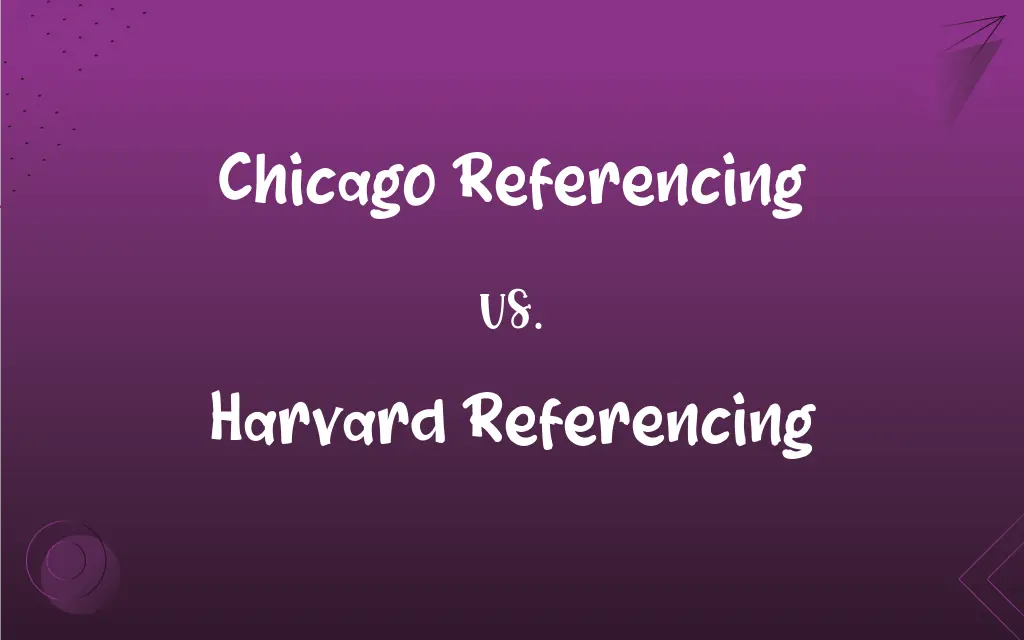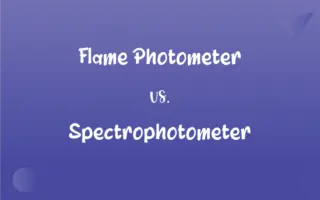Chicago Referencing vs. Harvard Referencing: What's the Difference?
Edited by Harlon Moss || By Janet White || Published on April 1, 2024
Chicago referencing involves footnotes or endnotes for citation and a bibliography, while Harvard referencing uses in-text parenthetical author-date citations and a reference list.

Key Differences
Chicago referencing offers a versatile approach, allowing for the use of footnotes or endnotes alongside a bibliography. This style accommodates a wide range of sources, from traditional books and journal articles to interviews and web content. Harvard referencing, in contrast, employs an author-date system within the text to cite sources, followed by a detailed reference list. This method is preferred for its simplicity and ease of use, particularly in the sciences and social sciences.
In the Chicago style, citations provide detailed information in the first reference, with subsequent references to the same source abbreviated. This method provides readers with immediate access to source details without disrupting the flow of reading. Harvard referencing, by utilizing the author-date format within the text, enables readers to quickly identify the source's author and publication year, with full details available in the reference list at the document's end.
The bibliography in Chicago referencing is comprehensive, listing all sources cited in the footnotes or endnotes and any additional readings. This contrasts with Harvard referencing, where only cited works are included in the reference list, streamlining the documentation process but offering less breadth in source acknowledgment.
For authors using Chicago referencing, the flexibility in citation methods accommodates diverse documentation needs, from academic papers to books and historical texts. Harvard referencing, with its straightforward parenthetical citations, is favored for its clarity and conciseness, making it ideal for articles and research papers that prioritize a streamlined presentation of sources.
Despite their differences, both Chicago and Harvard referencing styles share a common goal: to credit sources and enable readers to trace the origins of ideas. The choice between them often depends on disciplinary preferences, publication requirements, or personal inclination, underscoring the importance of adhering to specific guidelines for scholarly communication.
ADVERTISEMENT
Comparison Chart
Citation Format
Footnotes or endnotes for citations, with a detailed bibliography
In-text parenthetical author-date citations, followed by a reference list
Usage
Preferred in humanities, especially history and literature
Common in sciences and social sciences
Author Information
Full author details in the first citation, abbreviated in subsequent citations
Author's last name and year of publication in all citations
Page Numbers
Included in the footnotes or endnotes for specific page referencing
Often included in the citation to specify the referenced part
Bibliography/Reference List
A comprehensive list including all sources cited and consulted
A list of all works cited in the text, not including additional readings
ADVERTISEMENT
Chicago Referencing and Harvard Referencing Definitions
Chicago Referencing
Chicago referencing is known for its detailed citation format.
Chicago style's comprehensive approach ensures thorough documentation of sources.
Harvard Referencing
Harvard referencing simplifies the citation process with parenthetical citations.
The simplicity of Harvard style is evident in its straightforward parenthetical citations within the text.
Chicago Referencing
Chicago referencing allows for the use of either the author-date or the notes-bibliography system.
Depending on the academic discipline, Chicago style offers flexibility in citation methods.
Harvard Referencing
Harvard referencing is widely used in scientific and social sciences.
Due to its clarity and conciseness, Harvard style is preferred in academic papers within the sciences.
Chicago Referencing
In Chicago style, subsequent citations of the same source can be shortened.
After a full footnote citation, Chicago referencing permits shortened citations for the same source.
Harvard Referencing
Harvard referencing employs an author-date citation system.
In Harvard referencing, in-text citations include the author's surname and the year of publication.
Chicago Referencing
Chicago referencing is a citation style using footnotes or endnotes.
In the Chicago style, each citation in the text corresponds to a detailed note at the bottom of the page.
Harvard Referencing
In Harvard referencing, the reference list is organized alphabetically.
The Harvard style's reference list is sorted alphabetically by the author's last name.
Chicago Referencing
Chicago style includes a comprehensive bibliography.
At the end of the document, Chicago referencing requires a bibliography listing all sources.
Harvard Referencing
Harvard style is characterized by its reference list.
All sources cited in-text must be listed in full at the end of the document in Harvard referencing.
FAQs
When is Harvard referencing preferred?
Harvard is commonly used in the sciences and social sciences for its simplicity.
What is Chicago referencing?
Chicago referencing includes footnotes or endnotes and a bibliography for citing sources.
When should I use Chicago referencing?
Chicago is often used in humanities, especially in history and literature.
How do I cite a book in Harvard style?
In Harvard, cite books in the text with the author's last name and year of publication, and provide full details in the reference list.
How do I cite a website in Chicago style?
In Chicago, include the author's name, page title, website name, publication date, and URL in footnotes or endnotes.
How do I cite a website in Harvard style?
In Harvard, include the author's last name and year of publication in the text, and provide full URL details in the reference list.
Can I use both Chicago and Harvard referencing in the same paper?
No, you should consistently use one style throughout your paper.
What is Harvard referencing?
Harvard referencing uses parenthetical author-date citations in the text and a reference list.
How do I cite a journal article in Chicago style?
Cite journal articles with the author's name, article title, journal name, volume, issue, year, and page numbers in Chicago style.
How do I cite a book in Chicago style?
In Chicago, cite books in footnotes or endnotes with the author's name, book title, place of publication, publisher, year, and page number.
How do I format the reference list in Harvard style?
Organize the reference list alphabetically by the author's surname and follow specific formatting rules for different source types.
Can I use abbreviations in Chicago referencing?
Yes, after the first full citation, you can use abbreviations in subsequent citations.
Do I include page numbers in Harvard citations?
Yes, include page numbers when citing a specific part or quote from a source.
How do I cite a journal article in Harvard style?
In Harvard, cite journal articles in the text with the author's last name and year, and detail in the reference list.
Is the bibliography in Chicago style alphabetical?
Yes, the bibliography is organized alphabetically by the author's last name.
How do I cite an edited book in Chicago style?
Include the editor's name, the title of the book, the publisher, year of publication, and page numbers in your citation.
How do I cite an edited book in Harvard style?
Cite the editor's last name and year of publication in the text, with full details including the word 'ed.' in the reference list.
What's the main difference between Chicago and Harvard referencing?
The main difference is the citation method: Chicago uses notes and a bibliography, while Harvard uses author-date in-text citations.
Are footnotes used in Harvard referencing?
No, Harvard referencing does not use footnotes for citations; it relies on in-text parenthetical references.
Is one referencing style better than the other?
No, the choice between Chicago and Harvard referencing depends on the academic discipline and publication requirements.
About Author
Written by
Janet WhiteJanet White has been an esteemed writer and blogger for Difference Wiki. Holding a Master's degree in Science and Medical Journalism from the prestigious Boston University, she has consistently demonstrated her expertise and passion for her field. When she's not immersed in her work, Janet relishes her time exercising, delving into a good book, and cherishing moments with friends and family.
Edited by
Harlon MossHarlon is a seasoned quality moderator and accomplished content writer for Difference Wiki. An alumnus of the prestigious University of California, he earned his degree in Computer Science. Leveraging his academic background, Harlon brings a meticulous and informed perspective to his work, ensuring content accuracy and excellence.
































































